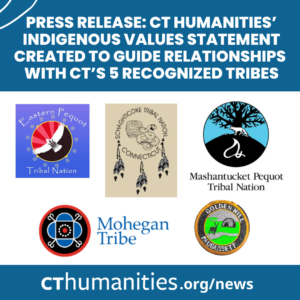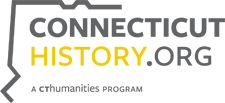As part of its organizational commitment to inclusion, diversity, equity, and access, CT Humanities (CTH) has created an Indigenous Values Statement that will shape the direction of its relationships with Connecticut’s five recognized tribes. A funder of more than 700 cultural organizations in the state, CT Humanities also seeks to provide guidance on supporting and engaging tribal communities.
FOR IMMEDIATE RELEASE, November 13, 2024
CONTACT: Dana Barcellos-Allen, dbarcellos-allen@cthumanities.org 860.937.6648
The statement recognizes the sovereignty and self-determination of the Eastern Pequot Tribal Nation, the Golden Hill Paugussett Tribal Nation, the Mashantucket Pequot Tribal Nation, the Mohegan Tribe, and the Schaghticoke. The CT Humanities Board of Directors approved the statement at its June meeting. During the past seven years, CT Humanities has been including Indigenous voices and perspectives in board governance, through partnerships, grantmaking, and projects.
“While the concept and practice of tribal consultation has a long national history, it doesn’t always exist at every level of the government or the non-profit sector,” said CT Humanities Board Vice Chair Ruth G. Torres (Schaghticoke), who serves as tribal community member in residence and student engagement specialist at Brown University.
“That CT Humanities has publicly committed to working with the five CT Tribes – honoring tribal sovereignty and building and maintaining relationships with the tribes – is integral to these partnerships,” Torres said. “It is not a one-sided effort, however, and I am looking forward to seeing the Tribes take an active role in ways that engage with the humanities.”
Dr. Sandy Grande (Quechua), CT Humanities’ board member-at-large and professor of Political Science and Native American and Indigenous Studies at University of Connecticut, said she is grateful to CT Humanities for the outreach, time, and labor that went into drafting the Indigenous Values Statement.
“I know they are not just empty words but signify a real commitment to the Indigenous peoples of Quinnehtukqut and the ongoing work we need to do to reckon with Connecticut’s history and present,” she said. “I think now, more than ever, recognizing and adhering to Indigenous values of living in good relation to each other, the land, and all her relations, is the path toward realizing better futures for all of the state’s communities.
“Connecticut has been ground zero for Indian affairs in our Nation’s past,” said Dr. Jason R. Mancini, CT Humanities executive director and former executive director of the Mashantucket Pequot Museum and Research Center.
“So our relationships now and in the future will be oriented towards equity and justice,” he said. “I’m humbled that CT Humanities board and staff have so thoughtfully embraced our engagement with the five tribes.”
The Indigenous Values Statement aligns with CT Humanities principles including its:
- IDEA (Inclusion, Diversity, Equity, and Access) commitment to supporting “partners in generating humanities content that represents the breadth of Connecticut’s people.”
- Funding priorities, which give preference to, among other criteria, projects that explore topics and stories in an inclusive, diverse, and equitable manner.
CT Humanities hopes this statement provides clarity to organizations seeking grant funding. Because questions from prospective grantees were a catalyst behind its creation, CTH staff have created a resource list that provides guidance on projects related to Native American and Indigenous peoples and their histories and cultures at cthumanities.org/indigenous. Answers to frequently asked questions (FAQs) will be forthcoming.
“In my mind, this is good for everyone in Connecticut and beyond,” Torres said.
CT Humanities’ Indigenous Values Statement in full:
CTH is committed to supporting, partnering, and collaborating with the five State and Federally Recognized Tribes (hereafter referred to as “the five Tribes”) on initiatives important to their communities. We will include Indigenous voices and perspectives in board governance, through partnerships, grantmaking, projects, and more.
Tribal Sovereignty
We respect the sovereignty and inherent rights of the Eastern Pequot Tribal Nation, the Golden Hill Paugussett Tribal Nation, the Mashantucket Pequot Tribal Nation, the Mohegan Tribe, and the Schaghticoke, all of which have a continuity of legal and political relationship with the State (and preceding colony) of Connecticut extending back into the 17th century.
Indigenous Resilience
Connecticut is the original homelands of many Indigenous people, including the five Tribes. When telling the many stories of Connecticut, it is important to work with the five Tribes. CT Humanities understands that genocide, dispossession, dislocation, enslavement/servitude, colonization, and termination are part of the complicated and nuanced history of the State of Connecticut. CT Humanities also understands that the five Tribes are active, vibrant, and resilient communities.
Indigenous Perspectives
Indigenous peoples and their traditional knowledges, systems of governance and politics, cultural expressions, voices, and perspectives are an integral component of Connecticut’s past, present, and future. CT Humanities is committed to sharing, reckoning with, and acknowledging these stories of resurgence and reclamation.
Relationship Building
Relationship building is at the heart of our work, and CT Humanities is committed to engaging with Indigenous partners and communities. We encourage and support making connections with the citizens, businesses, and cultural organizations of the five Tribes.
# # #
Connecticut Humanities (CTH) is an independent, nonprofit affiliate of the National Endowment for the Humanities. CTH connects people to the humanities through grants, partnerships, and collaborative programs. CTH projects, administration, and program development are supported by state and federal matching funds, community foundations, and gifts from private sources. Learn more by visiting cthumanities.org.









